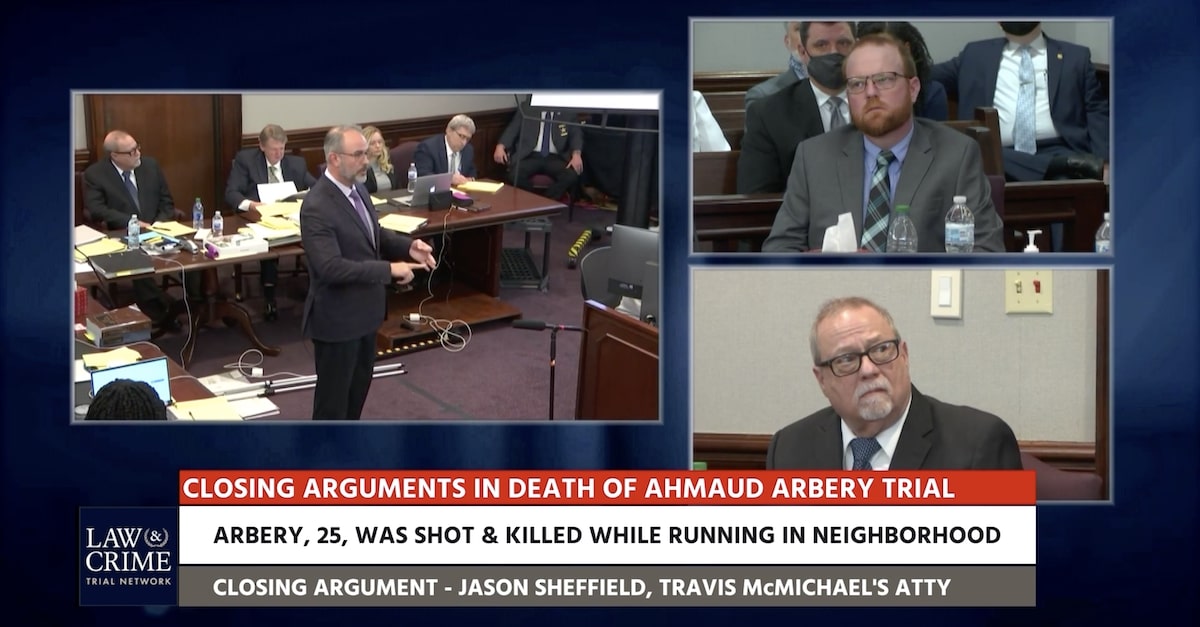
Just a week after trial began, a federal jury heard closing arguments in the federal case against Ahmaud Arbery’s convicted murderers. They will determine whether Travis McMichael, Gregory McMichael and William “Roddie” Bryan committed their crimes “because of Arbery’s race and color.”
“This Wasn’t About Trespassing”
For the Department of Justice’s attorney Christopher Perras, a key distinction for the jury came down to a simple distinction.
“There’s a big difference between being vigilant and being a vigilante,” Perras said in the first line of his summations.
On Feb. 23, 2020, Arbery was in the Georgia neighborhood of Satilla Shores when the three men started pursuing him. The trio cornered him after chasing him with their pickup trucks, and Travis McMichael fired three shots at him, killing him during a confrontation that Bryan captured on video.
The killers claimed to have been guarding the under-construction home of Larry English, who installed surveillance videos inside the site after he and others in the neighborhood experienced burglaries. After the cameras caught Arbery inside the site, the McMichaels and Bryan gave chase—claiming that they were trying to pursue a suspected trespasser.
Arbery was an avid jogger, and there was never any evidence that he took anything from English’s home. The prosecutor dismissed out of hand the possibility that Arbery could have been a suspect in a burglary, noting he never had a bag or anything else to tote the belongings. It remains a mystery why Arbery stopped at the site.
“Maybe Ahmaud was stopping to clear his mind, to be alone, to get away from it all,” Perras said, adding that the public will never know, because the McMichaels and Bryan killed him.
Perras also noted that these were not men with a deep-seated aversion to trespassing, showing evidence that they went hunting on private property and laughed about it.
“Travis McMichael even ripped down a ‘No Trespassing’ sign,” Perras noted, saying that the gunman had laughed about committing the same conduct.
“This wasn’t about trespassing,” Perras added. “It wasn’t about neighborhood crime. It was about race. Racial assumptions. Racial resentment and racial anger.”
“Macho Vigilante Fantasy”
Ever since trial began, the jury heard an earful of the killers’ racist invective. Gunman Travis McMichael was quoted saying of his workplace: “Zero n****rs work with me.” Trial evidence showed him repeatedly using racial slurs and sharing memes and online videos that did the same. One video entered into evidence had a country song titled “Alabama N****r,” by a singer named Johnny Rebel (Johnny Reb is the symbol of the “ordinary” Confederate soldier).
His attorney Amy Lee Copeland claimed during summations that those messages broke down to seven texts and five private social media messages, calling the missives “wrong” and “terrible,” but private. She claimed that there was no evidence that her client was a member of a white supremacist group.
Greg McMichael, the gunman’s father, launched into a “long, angry rant” after a colleague spoke to him about the death of civil rights luminary Julian Bond, the prosecutor said.
“I wish that guy had been put in the ground years ago,” Greg McMichael was quoted saying. “All those Blacks are nothing but trouble. I wish they would all die.”
That quotation came from a government witness, whose account was disputed by Greg McMichael’s lawyer Attilio J. Balbo, who noted his client was the only one of the three not quoted using the N-word.
Those slurs may be “horrible, repugnant, vile,” Balbo said, but they do not come from his client.
Four days before the shooting, Bryan was heard grousing about his daughter dating a Black man: “She has her a n****r now,” according to trial evidence.
Bryan’s attorney James Pete Theodocion said that federal prosecutors—whom he said have the ability to determine whether someone had a “pinky toe” in the U.S. Capitol on Jan. 6—found his client during his worst moments, but he depicted those comments as unrepresentative.
“That’s not his world. He’s not obsessed with race,” Theodocion insisted.
Between the three of them, the three men have been federally charged with five crimes, including interference with rights, attempted kidnapping and using a firearm in a crime of violence. The attempted kidnapping charge, which is leveled against all three, requires prosecutors to prove a benefit.
For them, Perras said, the benefit was an opportunity to live out a “macho vigilante fantasy” and act like the heroes of the neighborhood.
“The evidence showed that the McMichaels weren’t actually tough guys, but they wanted to be thought of themselves as tough guys,” Perras said, describing the trio later as “wannabe tough guys.”
The McMichaels are serving life sentences without the possibility of parole following their state murder convictions. The sentencing judge allowed Bryan to seek parole after 30 years, noting his lesser role in Arbery’s death. Bryan shot the video of the crime, which was leaked by his legal team in a backfiring effort to clear his name.
Before trial, the McMichaels were prepared to enter into agreements with federal prosecutors acknowledging that their crimes were racially motivated. Those plea deals would have had them serve the first 30 years of their sentences under federal custody. Arbery’s family opposed the deal, preferring that they remain incarcerated in state prison, which is perceived to be more brutal.
U.S. District Judge Lisa G. Wood rejected the terms of the agreements late last month.
The jury was sent to deliberation after the government’s rebuttal and the judge’s instructions.
(Screenshot from Law&Crime)